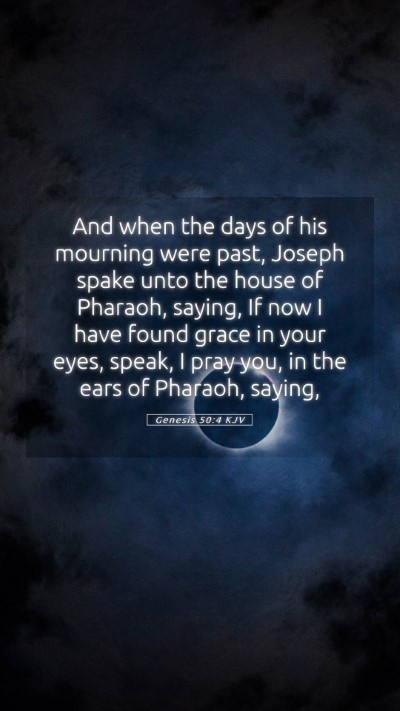Understanding Genesis 50:4: Meaning and Commentary
Genesis 50:4 states: "And when the days of his mourning were past, Joseph spake unto the house of Pharaoh, saying, 'If now I have found grace in your eyes, speak, I pray you, in the ears of Pharaoh, saying.'" (KJV)
Bible Verse Meanings and Interpretations
This verse marks a significant moment in the narrative of Joseph, who, after the death of his father Jacob, enters into negotiation with Pharaoh regarding a proper burial for his father in Canaan.
- Contextual Understanding: The previous chapters describe Jacob's death and the mourning that follows. Joseph's actions reflect cultural customs of mourning as well as the respect he holds for his father.
- Joseph's Leadership: Joseph's request to Pharaoh signifies his elevated status and influence within Egypt. It indicates his ability to speak freely to Pharaoh, highlighting both favor and authority that God has given him.
- Theological Significance: This verse reflects the importance of honoring one's parents. Joseph’s desire to fulfill his father’s last wishes exemplifies loyalty and filial piety.
Bible Verse Commentary
The following insights from notable Bible commentators provide further depth to Genesis 50:4:
Matthew Henry's Commentary
Matthew Henry emphasizes the sophistication in Joseph's approach, suggesting that he did not simply assume he could act on his father's wishes without consulting Pharaoh. He interprets this as a sign of wisdom and respect for authority.
Albert Barnes' Notes on the Bible
Albert Barnes highlights the practice of mourning in Egyptian culture, noting that the length of mourning reflects Jacob's significance and Joseph's status. He underlines that Joseph’s communication with Pharaoh is not just about logistics but also about maintaining respect for his family's traditions.
Adam Clarke's Commentary
Adam Clarke delves into the nuances of Joseph's mourning period, stating that it represents the deep connection between Joseph and his father. He suggests that this mourning and subsequent request showcase the emotional depth within this narrative, which resonates with the readers on both personal and spiritual levels.
Practical Application of Genesis 50:4
For readers looking to integrate the teachings from Genesis 50:4 into their lives, several applications arise:
- Honor Your Parents: Just as Joseph honors Jacob, individuals are encouraged to recognize and value their parents' wishes and legacies.
- Respect Authority: Joseph's approach to Pharaoh teaches the importance of approaching leaders and authorities with respect and consideration.
- Cultural Sensitivity: Acknowledging diverse mourning practices and traditions within families can foster empathy and understanding in community interactions.
Related Bible Cross References
- Exodus 20:12: "Honor your father and your mother..." - Emphasizing the importance of familial respect.
- Genesis 49:29-32: Jacob's instructions for his burial resonate throughout this passage.
- Genesis 50:1-3: The mourning period for Jacob illustrates the significance of grieving and honoring the deceased.
Conclusion
Genesis 50:4 serves not only as a historical account within Joseph’s life but also as a mirror reflecting values such as respect, leadership, and familial love. Understanding Scripture through diligent bible study tools and resources enhances one’s perspective on these enduring truths.


